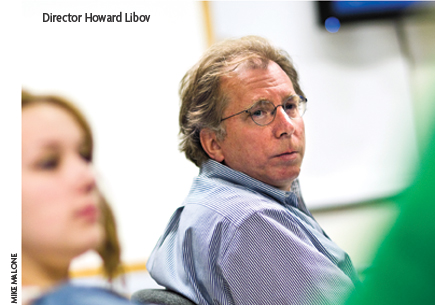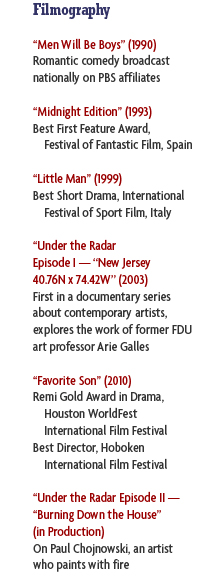
Directed by Professor Stephen Hollis and well trained for the vigors of theater life, FDU students rise to the challenge of Shakespeare’s “Two Gentlemen of Verona.”
The United Nations Academic Impact promises to address worldwide challenges and engage students in global concerns.
Catch a sneak preview of the award-winning film “Favorite Son” with writer, director and professor Howard Libov.
Professor David Hanson’s images of the World Trade Center have become a moving historical tribute.
John Vitale describes his FDU study abroad experience in Japan, from mountain villages to the bustling Tokyo.Alumni Profile
International Alumnus Finds Global Success
John Mangeli, BS'64 (M)Alumni Profile
Reaching Out to Stricken Haiti
Donna Bruno Stuart, AA'60 (T)


As I was studying, probably to become a lawyer, but questioning the usefulnessof yet another research report (research is now something I love and find indispensable),I made my first documentary film. It was about the owner of a localdiner, the fellow who flipped pancakes for both locals and undergrads, who haddecided to run for city council. We followed him, got to know him, his neighbors and supporters,and then watched (and filmed) on election night as he took an early position among the topof the eight who would make up the council. As the night wore on he fell, one spot at a time,until he was out of the running, and the room was, not coincidentally, emptying out. It was agreat experience and probably the first that led me to think, “I can make this my work!”
I transferred to NYU, [New York University] majored in film, and worked in the documentary form. Later, my first job was with CNN, literally when it was beginning. I was one of those people laid out on the ground, snaking computer cables under the floor. As a writer, I was asked to summarize a brutal guerilla raid on a South-American village in a 20-second “reader” for the anchor. I knew then that my news career was finished.

I attended graduate film school at the American Film Institute in Los Angeles. Tony Vellani, who had taught David Lynch and John McTiernan in earlier days, was a great mentor, and I revere him still. I wanted to make stories of my own, not summarize those that came over the newswire.
My very first screenplay was optioned by a studio, and years later (the time it took is a lesson in itself) was produced as “Midnight Edition.” The film was about a reporter who, just as he decides that he needs to spend more time working on his family life, runs, almost literally, into “the story of his life.” His family and neighbors don’t understand what draws him to the story of a mass murderer, but he is unable to turn away. The balance he seeks to find becomes a real challenge for him — and illustrates a theme that would become “mine.”
Even “Men Will Be Boys” [my romantic comedy broadcast nationally on PBS affiliates], nominally about two best friends and next-door neighbors who fall in love with the same woman, is about balance — love versus friendship. It’s the theme, not the subject, that attracts me to a story. And, for me, that theme seems always to be about balance versus obsession.
In the case of “Favorite Son,” I wanted to tell a story that would appear to audiences to be about a “fall from grace” but was really about an unlikely hero. The challenge was to keep our lead character, David (well played by Pablo Schreiber), sympathetic or interesting enough so audiences would keep watching, and of course to make him a hero in the end, hopefully to the surprise of audience members.
My next film [“It Must Be Love”] is about a guy who wants to stay away from involvements in order to simplify his life. And then he falls in love …
FDU Magazine is published twice yearly by the Office of Communications and Marketing, Fairleigh Dickinson University, 1000 River Road, H-DH3-14, Teaneck, N.J. 07666.
FDU Magazine welcomes your comments. E-mail Rebecca Maxon, editor, at maxon@fdu.edu.
J. Michael Adams, President; Richard Reiss, Senior Vice President for University Advancement; Angelo Carfagna, Assistant Vice President for University Advancement and Communications; Okang McBride, Director of Alumni Relations; Carol Kuzen Black, Director of Publications/Senior Editor; Rebecca Maxon, Editor and Web Designer;
Contributors: Howard Libov, Tom Nugent, Melissa Payton, John Vitale
Photo/Illustration Credits: Bill Blanchard, Bill Cardoni, Gary Darden, Favorite Son Productions, Don Hamerman, David Hanson, Ted Horowitz Photography, Dan Landau, Mike Malone, Morteza Nikoubazl, Gloria Pastorino, Nick Romanenko, Danny Schwartz, Jayson Scrimizzi, Daniel Twomey, John Vitale
For a print copy of FDU Magazine, featuring these and other stories, contact Rebecca Maxon, editor, at maxon@fdu.edu.
To update your address e-mail fine@fdu.edu or update your profile online at www.MyFDU.net.
©Copyright 2011 Fairleigh Dickinson University. All rights reserved.




